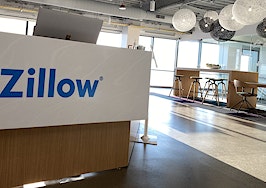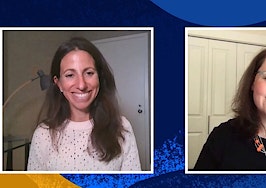When Zillow returned to homebuying through its iBuyer platform Zillow Offers it did so with the wisdom and guidance of one of the nation’s former top doctors, Dr. Regina Benjamin.
Benjamin, the former surgeon general under President Barack Obama from 2009 to 2013, at one time guided the nation’s public health policy. She brings that expertise to a new role as an advisor to Zillow, as the company deploys its “Move Forward. Stay Safe.” initiative.
Benjamin spoke with Inman about her role with Zillow, whether or not she believes the pandemic will interrupt the real estate industry again and the link between health and home.
How did the partnership with Zillow come about? What does the pitch from a real estate company to the former Surgeon General of the United States look like?
My time as a family physician and also as Surgeon General. In both roles, prevention has always been the foundation of what I do. It’s the foundation of public health and the foundation of my role as a physician. When COVID-19 started, it was, how can I continue my work in public health and how can continue the prevention aspect of it.
As the Surgeon General, my role as America’s Doctor was to give the American people information about public health based on the best science and based on the best research that’s available so that they can make healthy choices and healthy decisions as well as serving as the vice admiral of the United States Public Health Corps. As Surgeon General, I released the national prevention strategy which is America’s plan for health and wellness. Two of the pillars on which that document is based really fit in with housing and real estate. One of those is basically health and safety of the environment and community.
When Zillow approached me is was like, this is the perfect way to extend what we’re doing with the national prevention strategy, trying to keep Americans healthy and well. There is a real connection between housing and health — health of the community and the individual. I was really pleased that Zillow understood that.
Has the current COVID-19 pandemic underscored just how strong the link between home and health is?
It has. Traditionally, health and safe housing is really one of the social determinants of health. We know that shelter of a healthy home is a basic essential that we all strive for. That’s laid out in the national prevention strategy as well.
When you look at COVID-19, it’s changed our lives a lot, in that people are no longer working at their desk or an office, they’re no longer in cubicles, they’re working from home. And much of this working from home is probably part of our new normal as we get on the other side of the pandemic.
People are starting to look at new ways of moving forward with purchasing new houses. Maybe they want a bigger house or one with room enough for a home office or enough space that they’re not taking up the family room when they try to work and the kids also need to be doing their homework. Everyone’s needs are different. They may want to be closer to their family because they’re home more.
The real estate market has continued to move forward in spite of COVID-19 and sometimes because of it, depending on how you look at it. Our question is and my big concern is — which I was pleased Zillow was also interested in — how do we do that safely? How do we move forward and stay safe. That’s where we come together in alike minds, purposes and goals.
Do you think Zillow Offers can provide a safer alternative right now to the traditional home sale process?
Zillow Offers is just one part of it, but it’s a good part in that, if you don’t want to be interacting with people, you can, as a seller, sell your home to Zillow and they can sell it. You can step out of it and leave it to someone else.
In addition, Zillow also works with the buyer. They can use the 3D virtual tour, which is already there but it’s much more useful now that you can see the home using the technology. A purchaser may want their agent to do a video tour and the agent can take their phone or camera around while talking to their client. The client can say, ‘can you show me that closet again, or can you show me such-and-such,’ just using technology to stay safe.
It’s the same thing with virtual closings and e-signature technology. Those sorts of things are a way to help you socially distance and keep yourself and your family safe when you’re trying to purchase a home.
Do you think this is sort of a short-term change in consumer behavior or do you think the things that companies like Zillow are putting into place are here to stay and reflect a long-term change?
My personal thought is that much of it is here to stay. There are some parts of it that we want to feel and touch but there are some parts that are here to stay. We’re not only seeing it in the real estate business but also in health care. We’re doing many more telemedicine visits than we’ve ever done before out of necessity but also because they’re convenient. It won’t replace visiting the doctor, but we can add it and make the experience much better and more convenient.
What guides best practices in building out Zillow’s processes around health and safety for in-person interaction? Are there certain benchmarks the company needs to hit that you’ve learned from your time in public service?
So Zillow has a great team. They come up with their proposals, plans, policies and procedures and I meet with the team at least once a week to look over them before they are published or implemented to see if there’s anything missing, to see if there’s anything new to add. One thing I will say for sure, with COVID-19 particularly is, as the science changes, the policies may have to change so we’re constantly revisiting to make sure they’re still up to date. I use my experience as well as my connections with others in the public health community to know what’s the best practices out there, what science is available — and it moves quite quickly sometimes. Often times I will ask experts as well, what do we have that is the best science that is available right now?
What we’re seeing right now, as we start to open up markets, things change. Here in the south, where I am, our cases are skyrocketing with a lot of hospitalizations, and ICU beds are getting to capacity. We’re having to back off on some of the things that we put into place as a state. So if you look at real estate, we have to look at these things too, depending on the market to keep people safe.
How do you adjust these regulations based on the regionality of the virus? In New York, it was really bad and has improved a lot and in places like Texas and Florida, it’s starting to get worse.
That’s why we’re constantly re-evaluating. In the south right now, we have a lot more virus circulating in the community than we had before and the infection rate is higher. That’s why we have to really assess what we’re doing. We want to make sure that our employees — as well as the customers, as well as the contractors — are all safe and doing the things that they can do to remain as safe as possible.
There’s the three Ws: wash your hands, wear a mask and watch your distance. You do those three things religiously.
Do you envision any scenario where the virus continues to spread and Zillow and other iBuyers have to shut down homebuying again? Do you think we’ll get to a place where the real estate market will grind to a halt again like in March and early April or will all the recent tech advances prevent that?
Having this technology and putting it into place will help. People need to be able to have shelter and have a home. I saw it after Hurricane Katrina down here. In my town, 80 percent of the town lost their home, they didn’t have any livable homes. The impact that had on physical health — it was very difficult to keep blood pressures under control, diabetes under control — and mental health, sadness and depression and those who had serious mental health issues, would really just deteriorate. Housing really gives you stability.
So getting back to your question, I think that the real estate industry will continue to move forward, at least residential real estate will.







